Treatment for psychosis
Treatment for psychosis approach may vary depending on the underlying cause. You will receive specific treatment if you have also been diagnosed with an underlying mental health problem.
Your treatment for psychosis will likely require a team of mental health professionals to work together. If this is your first psychotic occurrence, you may be referred to work with an early intervention group.
An early intervention team is a team of health professionals set up specifically to work with people who have experienced their first episode of psychosis.
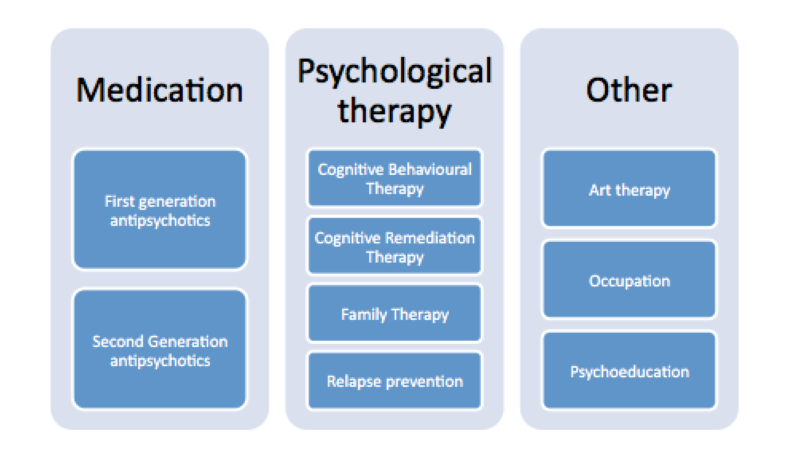
Depending on your care needs, early intervention teams aim to provide:
- a full assessment of your needs
- medicine
- psychological therapies
- social, professional, and educational interventions
Treatment for psychosis can do much to relieve, or even eliminate, the symptoms of psychosis. Treatments for psychosis include:
Medications for psychosis
Certain medications for psychosis such as anti-psychotics help the brain to restore its normal chemical balance.
Antipsychotic medicines are usually recommended as the first treatment for psychosis. They work by blocking the effect of dopamine, a chemical that transmits messages in the brain.
However, they’re not suitable or effective for everyone, as side effects can affect people differently. In particular, antipsychotics will be monitored closely in people who also have epilepsy, a condition that causes seizures or fits.
People who have cardiovascular disease – conditions that affect the heart, blood vessels, or circulation, such as heart disease – will also be closely monitored.
Antipsychotics can usually reduce feelings of anxiety within a few hours of use, but they may take several days or weeks to reduce psychotic symptoms, such as hallucinations or delusional thoughts.
Antipsychotics can be taken by mouth (orally) or given as an injection. There are several slow-release antipsychotics, where you only need an injection every 1 to 4 weeks.
Side effects from medications for psychosis
Antipsychotics can have side effects, although not everyone will experience them and their severity will differ from person to person.
The most common side effects are:
- Drowsiness
- Shaking and trembling
- Weight gain
- Restlessness
- Muscle twitches and spasms – where your muscles shorten tightly and painfully
- Blurred vision
- Dizziness
- Constipation
- Loss of sex drive (libido)
- Dry mouth
Tell your GP or mental health worker if you have side effects that are becoming particularly troublesome. There may be an alternative antipsychotic medicine you can take that causes fewer side effects.
Never stop taking medicine prescribed for you unless advised to do so by a qualified healthcare professional responsible for your care.
Suddenly stopping prescription medicine could trigger a return of your symptoms (relapse). When it’s time for you to stop taking your medicine, it will be done gradually.
Therapy for psychosis – effective secondary form of treatment for psychosis
Therapy for psychosis is based on an understanding of how people make sense of their experiences and why some people become distressed by them. Therapy for psychosis may encourage you to consider different ways of understanding what’s happening to you. The aim is to help you achieve goals that are meaningful and important to you, such as reducing your distress, returning to work, education or training, or regaining a sense of control.
What is psychosis?
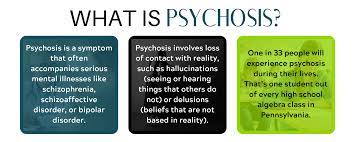
Psychosis is a general term to describe a set of symptoms of mental illnesses that result in strange or bizarre thinking, perceptions (sight, sound), behaviors, and emotions. Psychosis is a brain-based condition that is made better or worse by environmental factors – like drug use and stress.
Around three percent of people will experience a psychotic episode at some point in their life. In any given 12-month period, just under one in every 200 adult Australians will experience a psychotic illness.
The period of time where people experience psychotic symptoms is known as an ‘episode’ of psychosis. Some people only experience a few episodes of psychosis or a brief episode that lasts for a few days or weeks. Others will experience symptoms more frequently, in association with a longer-term illness such as schizophrenia.
The first episode of psychosis usually occurs in a person’s late teens or early 20s.
Schizophrenia vs psychosis
Psychosis is a syndrome or group of symptoms. Someone experiencing an episode of psychosis is having a ‘break’ with reality. Major symptoms of psychosis are hallucinations and delusions. Hallucinations are sensations that are not real, such as hearing voices or sounds that aren’t real. Hearing voices is a common hallucination, but hallucinations can be experienced with any sense—hearing, sight, smell, taste, or touch. Delusions are strong beliefs that can’t possibly be true. Common delusions include the belief that someone is following or monitoring you or the belief that you have extraordinary powers or abilities. Other symptoms of psychosis include difficulties concentrating, completing tasks, or making decisions. Thoughts may feel ‘jumbled’ or confused. Some people have a hard time following conversations or speaking clearly. Psychosis can even affect the way people move or express their emotions.
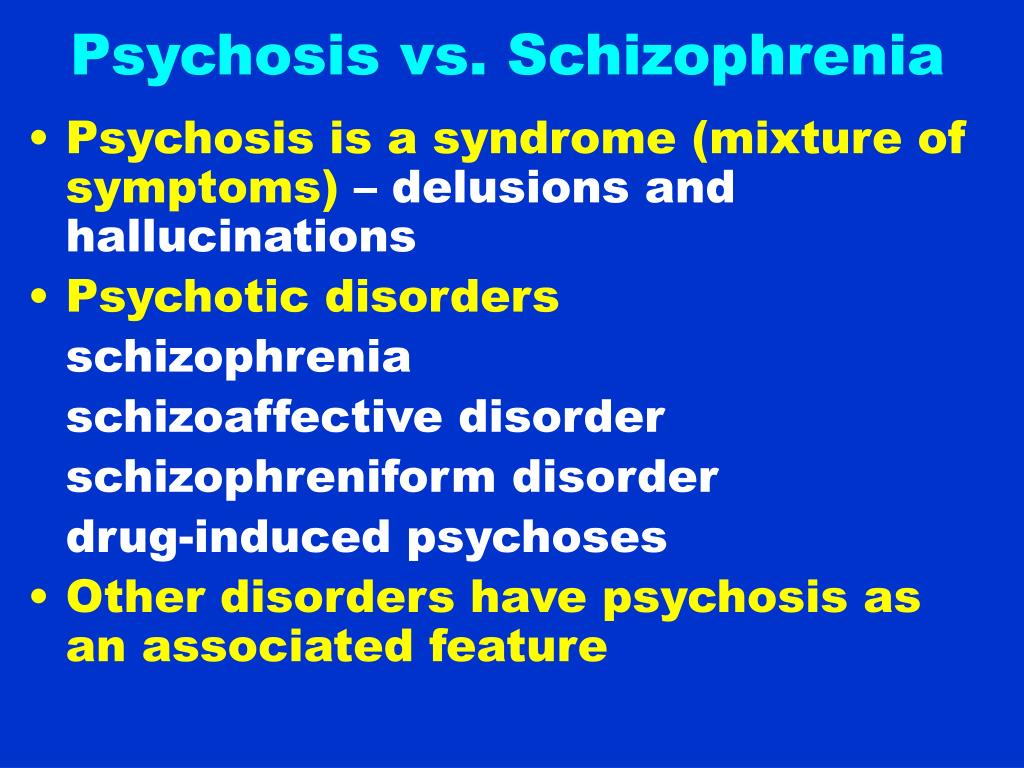
Schizophrenia is a mental illness that causes psychosis, but schizophrenia also has other symptoms. And it isn’t the only cause of psychosis. In some cases, other mental illnesses cause psychosis, including depression, bipolar disorder, dementia, and borderline personality disorder. Psychosis may come up during times of extreme stress, a major lack of sleep, or trauma. People who are using or withdrawing from certain drugs or medications may experience psychosis. Psychosis may also be caused by a brain injury, neurological problem, or other health problem. So while psychosis can be a part of schizophrenia, it can be caused by many other things too.
Schizophrenia is a serious mental health disorder that affects how a person thinks, feels, and acts. People with schizophrenia may have trouble distinguishing what is real and what is imaginary.
Types of psychosis
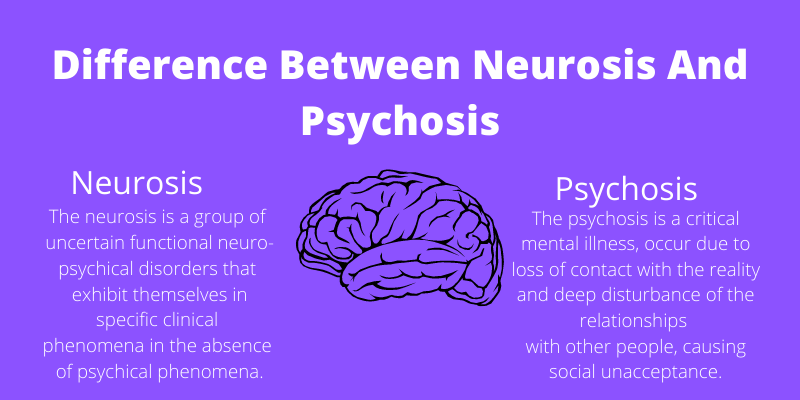
Conditions that have psychosis as the main symptom are referred to as psychotic disorders; however, psychosis may also occur as a feature of other disorders like bipolar or major depression. Some of the more common types of psychosis include:
- Schizophreniform Disorder: consists of the same symptoms of Schizophrenia but occurs for a time period of at least one month but no more than six months. If symptoms last longer than this period, a person is given a diagnosis of Schizophrenia.
- Schizoaffective Disorder: is characterized by persistent symptoms of psychosis resembling schizophrenia with additional periodic symptoms of mood (or affective) disorders.
- Delusional Disorder: is characterized by irrational or intense belief(s) or suspicion(s) which a person believes to be true. These beliefs may seem outlandish and impossible (bizarre) or fit within the realm of what is possible (non-bizarre). Symptoms must last for 1 month or longer in order for someone to be diagnosed with delusional disorder.
- Brief Psychotic Disorder: includes symptoms of psychosis that last at least 1 day but no longer than 1 month. Symptoms are typically sudden and are sometimes responses to a stressful life event. While an individual may experience severe distress during the episode, people quickly return to their daily lives and their symptoms do not return.
- Schizotypal Disorder: is a personality disorder that can easily be confused with schizophrenia due to the nature of people with a schizotypal personality disorder to have “magical” or eccentric beliefs, unusual thoughts, and paranoia. People with schizotypal personality disorder may experience brief psychotic episodes with delusions or hallucinations, but the episodes are not as frequent, prolonged, or intense as in schizophrenia.
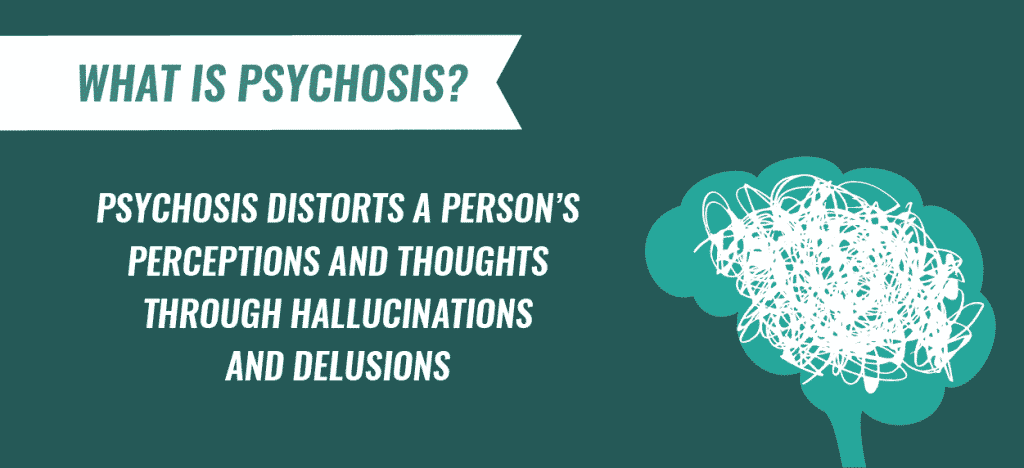
Symptoms of psychosis
Each person who develops psychosis will have his/her own unique set of symptoms and experiences, according to their particular circumstances.
Common symptoms of psychosis are:
- Hallucinations (seeing, hearing feeling, or tasting things that other people don’t)
- Feeling overwhelmed by sensory information (lights seem too bright, noises too loud)
- Difficulty filtering stimulation from the environment
- Delusions (false personal beliefs based on incorrect inferences about the reality that are inconsistent with culture and previous beliefs, and which are firmly sustained in spite of evidence or proof to the contrary)
- Confused thinking or speech
- Difficulty doing ordinary things (often includes problems with memory, attention, putting thoughts together)

Other symptoms of psychosis include:
- A sudden loss of interest in things that the person used to find enjoyable
- Inability to do the things that the person could do before (e.g., a person who normally loves math suddenly can’t do it anymore)
- Social withdrawal and isolation from friends and family
- Dramatic changes in sleep pattern
- Statements or behavior that is bizarre and inconsistent with what’s going on around them
Who experiences psychosis?
Anyone can develop psychosis. Many people see or hear things that others don’t, or have ideas that are unusual. Psychosis is only a problem when it is causing you or someone close to you significant distress or harm.
It affects 3 in 100 people and usually occurs for the first time between the ages of 15 and 30. Men often develop psychosis 5 to 10 years younger than women. It can be caused by a variety of medical illnesses, sleep deprivation, severe stress or trauma, drug reactions, genetic predisposition, and other factors.
What causes psychosis?
What causes psychosis? Psychosis can be caused by a mental (psychological) condition, a general medical condition, or alcohol or drug misuse. Below are some of the general causes of psychosis:
Psychological causes
The following conditions have been known to trigger psychotic episodes in some people:
- Schizophrenia – This is one of the causes of psychosis, it is a mental health condition that causes hallucinations and delusions
- Bipolar disorder – a person with bipolar disorder can have episodes of low mood (depression) and highs or elated mood (mania)
- Severe stress or anxiety
- Severe depression – feelings of persistent sadness, including postnatal depression, which some women experience after having a baby
The underlying psychological cause often influences the type of psychotic episode someone experiences. For example, a person with bipolar disorder is more likely to have grandiose delusions. Someone with depression or schizophrenia is more likely to develop persecutory delusions.
The causes of psychosis are not fully understood. It is likely that psychosis is caused by a number of factors including:
- Genetic vulnerability – family history of psychotic disorder
- Chemical imbalance in the brain
- Substance use, particularly cannabis, speed, or ice
- Environmental factors
- Psychosocial stress – for people who have had an episode of psychosis, significant stress may be a factor in the development of further episodes.
Natural treatment for psychosis
Natural treatment for psychosis is another treatment for psychosis that has been proven to be effective without causing any side effects.

Lister below are the most effective natural treatments for psychosis
Acupuncture – an ancient Chinese natural treatment for psychosis
Acupuncture for psychosis is another natural treatment for psychosis that has been proven to be effective.
A literature search was carried out using Ovid, Medline, Psych-info, Yahoo, Google, and author contact to discover what research has taken place to date.

This yielded evidence that acupuncture for psychosis is effective in the treatment of psychosis. Although most of the research is from China and is somewhat dated, a number of studies have also been conducted in the West with promising outcomes.
Hypnosis – one of the most effective treatments for psychosis.
Hypnosis for psychosis is a form of natural treatment for psychosis that uses guided relaxation, intense concentration, and focused attention to achieve a heightened state of awareness that is sometimes called a trance. The person’s attention is so focused while in this state that anything going on around the person is temporarily blocked out or ignored. In this naturally occurring state, a person may focus their attention — with the help of a trained therapist — on specific thoughts or tasks.
Hypnosis is usually considered an aid to psychotherapy (counseling or therapy) because the hypnotic state allows people to explore painful thoughts, feelings, and memories they might have hidden from their conscious minds. In addition, hypnosis enables people to perceive some things differently, such as blocking an awareness of pain.
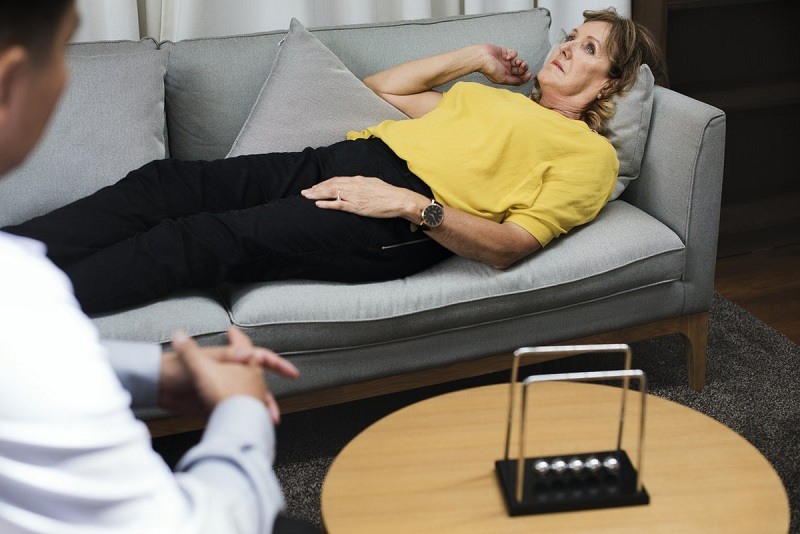
Hypnosis for psychosis can be used in two ways, as suggestion therapy or as psychoanalysis.
- Suggestion therapy: The hypnotic state makes the person able to respond to suggestions. Therefore, hypnotherapy can help some people change certain behaviors, such as stopping smoking or nail-biting. It can also help people change perceptions and sensations, and is particularly useful in treating pain.
- Psychoanalysis: This approach uses the relaxed state to explore a possible psychological root cause of a disorder or symptom, such as a traumatic past event that a person has hidden in their unconscious memory. Once the trauma is revealed, it can be addressed in psychotherapy.
Homeopathy – #1 natural treatment for psychosis
Homeopathy for psychosis aims at the use of deep-acting remedies that work on correcting the cause from which the disease is initiated so as to bring about remarkable recovery from psychosis. Below are the most common homeopathic remedies for psychosis:
Anacardium Orientale – For Auditory Hallucinations
- Anacardium Orientale is an important medicine for psychosis where a person hears voices. Other attending features are extreme sadness, absent-mindedness, and suspicion. Forgetfulness, aversion to work, desire to swear, and cursing are also some characteristic symptoms that may accompany.
Hyoscyamus Niger – For Delusion of Being Poisoned
- Hyoscyamus Niger is useful in cases where the patient thinks someone is going to poison them. In most cases, as a result, they avoid eating or drinking.
Baryta Carbonica – For Suspicion that a person is being talked about
- Baryta Carbonica is helpful in treating psychosis where sufferers have a high suspicion that other people are talking about them. There is also a feeling that they are being made fun of and people always laugh at them.
Natural treatment for psychosis in Philadelphia
The ideal psychosis treatment facility is one that suits your needs and has a proven track record in your specific situation. There are a number of possible reasons that can make it difficult to find the best treatment for psychosis, but getting help as soon as possible is paramount to protect yourself and control the symptoms of a psychotic disorder.
Unlike a dentist or therapist, you cannot simply ask friends to refer you to a specialist that provides natural treatment for psychosis. The solution to how to find the best treatment for psychosis is to ask people who are aware of the various causes of psychosis and the programs that meet the needs of patients with these complex conditions. We’re here to help. Please contact our clinic (215) 621-8485 if you or someone you know needs help finding the best establishment.
Philadelphia Homeopathic Clinic, the subdivision of Philadelphia Holistic Clinic located in the northeast region of the City of Brotherly Love. Here, the most experienced, licensed medical providers, under the supervision of medical doctor Victor Tsan treat patients from different forms of psychological disorders using only natural approaches.
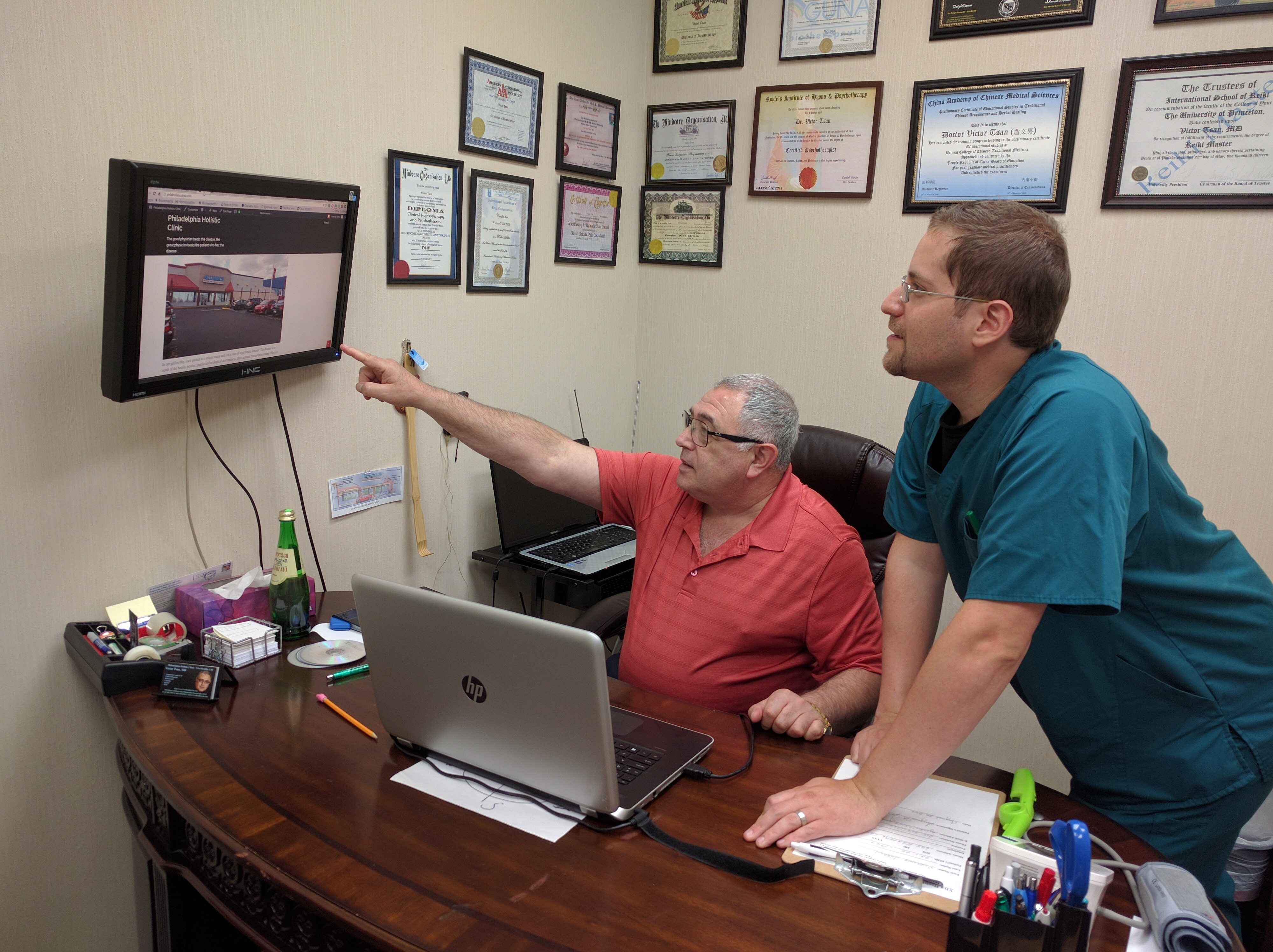
At the clinic, we understand patients’ needs and sufferings. During the course of treatment, you will become a family member of our team and you will feel it every time you are in the office.
To schedule your appointment for a comprehensive holistic evaluation call our office or scan the QR code below to be redirected to our online booking application.

Comments
Post a Comment